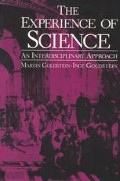Abstract
In this chapter we turn to the question, where do we get scientific hypotheses? The way the question is phrased may be misleading. Put this way, it gives the impression that forming hypotheses is something unique to scientific activity. However, if we understand by the word “hypothesis” the perception of some pattern in phenomena, the establishment of some expectation as to what will happen next, we realize that “forming hypotheses” is something we do all the time and have been doing since birth. We are by nature hypothesis formers. At what age our practice of interpreting the world in such structured terms begins is not known, but long before we learn to talk in sentences we have already gone far beyond the raw impressions given us by our senses. We organize things coherently into such concepts as “mother,” “father,” “food,” and “doggy,” each of which implies a whole complex set of recognitions and expectations. We are not normally aware of how much of what we “see” is seen by inference and memory rather than with just our eyes. But there are occasions when this is brought home to us, as was discussed in Chapter 2, by the study of the kinds of optical illusions favored by psychologists and the puzzle pages of newspapers, by encounters with people of different cultures, by occasions where something radically unexpected happens, when, in the graphic but hackneyed phrase, “our whole world collapses about us.”
Access this chapter
Tax calculation will be finalised at checkout
Purchases are for personal use only
Preview
Unable to display preview. Download preview PDF.
Reference Notes
This quotation is apparently a paraphrase of Billings (the pseudonym of 19th century humorist Henry Wheeler Shaw), who actually wrote: “It is better tew know nothing than tew know what aint so.” We copied it when we saw it quoted somewhere, but we have forgotten the source. It is phrased better that way for our purpose than the way Billings actually put it.
Wolfgang Köhler, The Mentality of Apes (New York: Liveright, 1976).
Henri Poincaré, The Foundations of Science: Science and Hypothesis, The Value of Science, Science and Method. Translated by George B. Halstead (Lanham, Md.: University Press of America, 1982).
A. E. Housman, The Name and Nature of Poetry (Cambridge: Cambridge University Press, 1933).
Harry Wain, A History of Preventive Medicine (Springfield, IL: Charles C Thomas, 1970).
Hans Zinsser, Biographical Memoirs of Theobald Smith (Washington, DC: National Academy of Sciences, 1936).
Quoted in W. I. Beveridge, The Art of Scientific Investigation (New York: W. W. Norton, 1957).
P. B. Medawar, The Art of the Soluble (Harmondsworth: Penguin Books, 1969).
Suggested Reading
Ghiselin, Brewster, ed. The Creative Process: A Symposium. New York: New American Library, 1952.
Koestler, Arthur. The Act of Creation. New York: Macmillan, 1964.
Perkins, D. N. The Mind’s Best Work. Cambridge, MA: Harvard University Press, 1981.
Tweney, Ryan D., Michael E. Doherty, and Clifford R. Mynatt, eds. On Scientific Thinking. New York: Columbia University Press, 1981.
Author information
Authors and Affiliations
Rights and permissions
Copyright information
© 1984 Springer Science+Business Media New York
About this chapter
Cite this chapter
Goldstein, M., Goldstein, I. (1984). Where Do Hypotheses Come From?. In: The Experience of Science. Springer, Boston, MA. https://doi.org/10.1007/978-1-4899-0384-6_16
Download citation
DOI: https://doi.org/10.1007/978-1-4899-0384-6_16
Publisher Name: Springer, Boston, MA
Print ISBN: 978-1-4899-0386-0
Online ISBN: 978-1-4899-0384-6
eBook Packages: Springer Book Archive

